| Listing 1 - 10 of 57 | << page >> |
Sort by
|
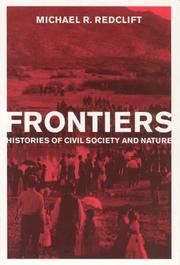
ISBN: 1282097539 9786612097539 0262282186 1429410019 9780262282185 9781429410014 9780262681605 0262681609 9780262182546 0262182548 0262264390 9780262264396 9781282097537 6612097531 Year: 2006 Publisher: Cambridge, Mass. : MIT Press,
Abstract | Keywords | Export | Availability | Bookmark
 Loading...
Loading...Choose an application
- Reference Manager
- EndNote
- RefWorks (Direct export to RefWorks)
In Frontiers, Michael Redclift examines the relationship between nature and society in frontier areas--contested zones in which rival versions of civil society vie with one another, often over the definition and management of nature itself. Drawing on his own fieldwork and extensive archival research, Redclift presents five cases in which civil societies emerged in frontier areas either to manage common property or to legitimize private holdings: common-pool resource management in the Spanish Pyrenees, European settlement on the forest frontier in nineteenth-century Canada, conflicts over land and water resources in coastal Ecuador, Mayan civil unrest in the Yucatan peninsula, and the encroachment of tourism on the Mexican Caribbean coast.Redclift describes a dialectical process in frontier regions in which human societies and their environments influence and illuminate one another: the frontier can be seen as a crucible in which both nature and civil institutions develop and "co-evolve." In each of the five case studies, he argues, migration and land settlement gave rise to ideologies of nature that reflected not only the social and ethnic characteristics of the settlers but also the the effects of market forces on the natural environment. In most of these areas the natural environment was transformed by the pressure of the market, especially global markets. Resistance to market pressure created new avenues for political activity and the representation of cultural identity. Frontiers deepens and broadens our understanding of the role of the frontier, which, Redclift argues, needs to be considered within a global context that is of continuing importance today.
POLITICAL SCIENCE --- History & Theory --- Environmental management. --- Civil society. --- ENVIRONMENT/General --- SOCIAL SCIENCES/Anthropology & Archaeology --- Social contract --- Environmental stewardship --- Stewardship, Environmental --- Environmental sciences --- Management --- Environnement --- Société civile --- Gestion
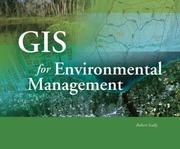
ISBN: 1589481429 9781589481428 Year: 2006 Publisher: Redlands, Calif. ESRI Press
Abstract | Keywords | Export | Availability | Bookmark
 Loading...
Loading...Choose an application
- Reference Manager
- EndNote
- RefWorks (Direct export to RefWorks)
This look at complex environmental challenges and their increasingly sophisticated technological solutions explores case studies of the most innovative geographic information system (GIS) projects yet devised by governments, businesses, and individuals. Each study showcases GIS solutions, yet balances the technology with practical human applications. Topics ranging from biodiversity and pollution to specific subjects such as coastal zone management and change detection make this text relevant for nontechnical audiences and GIS professionals alike.
Environmental management. --- Geographic information systems. --- Geographical information systems --- GIS (Information systems) --- Information storage and retrieval systems --- Environmental stewardship --- Stewardship, Environmental --- Environmental sciences --- Management --- Geography --- Geografie --- Geografische Informatie Systemen --- Toepassingen. --- Environmental management --- Geographic information systems
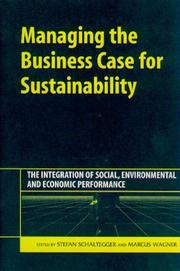
ISBN: 9781907643255 1907643257 135128052X 9781351280525 1874719950 9781874719953 1351280511 9781351280518 Year: 2006 Publisher: Sheffield Greenleaf
Abstract | Keywords | Export | Availability | Bookmark
 Loading...
Loading...Choose an application
- Reference Manager
- EndNote
- RefWorks (Direct export to RefWorks)
"The difficulties in moving towards corporate sustainability raise the question of how environmental and social management can be integrated better with economic business goals. Over the last decade, the relationship between environmental and economic performance, and more recently the interaction between sustainability performance and business competitiveness, have received considerable attention in both theory and practice. However, to date, only partial aspects of the relationship between sustainability performance, competitiveness and economic performance have been studied from a theoretical as well as an empirical perspective. And, to date, no unique relationship has prevailed in empirical studies. A number of explanations have been put forward to explain this, including methodological reasons, such as the lack of statistical data, the low quality of that data, or the fact that such data is often available for short time periods only. Other theoretical explanations have been developed, such as the influence of different corporate strategies or the relatively small influence of environmental or sustainability issues as one factor among many on the economic or financial success of firms. So, how should the business case for sustainability be managed?This is the starting point for this book, which compiles insights on a large number of aspects of the link between sustainability performance, business competitiveness and economic success in an attempt to provide a comprehensive and structured view of this relationship. The book provides an unrivalled body of knowledge on the state of theory and practice in this field and identifies prospective future fields of work. The book includes: conceptual frameworks for the interaction of social, environmental and economic issues in business environments; case studies of companies that have successfully integrated social, environmental and economic issues; analyses of the causal and empirical relationship between environmental and/or social performance, business performance and firm-level competitiveness; concepts and tools useful for improving business value with proactive operational strategies; assessment of the factors influencing operational sustainability strategies and their economic impact; and comparisons of interactions between sustainability performance and firm competitiveness across industry sectors and countries. Managing the Business Case for Sustainability is the definitive work in its field: the most comprehensive book yet published on the theory and practice of managing sustainability performance, competitiveness, environmental, social and economic performance in an integrated way. It will be essential reading for managers, academics, consultants, fund managers, governments and government agencies, NGOs and international bodies who need a broad and comprehensive overview of the business case for sustainability."--Provided by publisher.
Environmental management. --- Sustainable development. --- Development, Sustainable --- Ecologically sustainable development --- Economic development, Sustainable --- Economic sustainability --- ESD (Ecologically sustainable development) --- Smart growth --- Sustainable development --- Sustainable economic development --- Economic development --- Environmental stewardship --- Stewardship, Environmental --- Environmental sciences --- Management --- Environmental aspects --- Environmental management

ISBN: 128185607X 9786613792068 0231509626 9780231509626 023113536X 9780231135368 0231135378 9780231135375 023113536X 9780231135368 0231135378 9780231135375 Year: 2006 Publisher: New York Columbia University Press
Abstract | Keywords | Export | Availability | Bookmark
 Loading...
Loading...Choose an application
- Reference Manager
- EndNote
- RefWorks (Direct export to RefWorks)
In Understanding Environmental Policy, Steven Cohen introduces an innovative, multidimensional framework for developing effective environmental policy within the United States and around the world. He demonstrates his approach through an analysis of four case studies representing current local, national, and international environmental challenges: New York City's garbage crisis; the problem of leaks from underground storage units; toxic waste contamination and the Superfund program; and global climate change. He analyzes the political, scientific, technological, organizational, and moral impor
Environmental policy. --- Environmental management. --- Environmental stewardship --- Stewardship, Environmental --- Environmental sciences --- Management --- Environment and state --- Environmental control --- Environmental management --- Environmental protection --- Environmental quality --- State and environment --- Environmental auditing --- Government policy
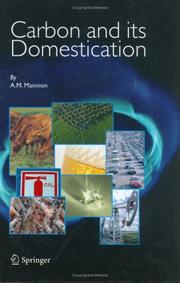
ISBN: 1280612576 9786610612574 1402039581 1402039565 1402039573 Year: 2006 Publisher: Dordrecht, The Netherlands : Springer,
Abstract | Keywords | Export | Availability | Bookmark
 Loading...
Loading...Choose an application
- Reference Manager
- EndNote
- RefWorks (Direct export to RefWorks)
Carbon is chemically versatile and is thus the body and soul of biological, geological, ecological and economic systems. Its appropriation by humans through diversion of its biogeochemical cycle has been a mainstay of development. This domestication is characterized by a number of thresholds: control of fire, development of agriculture, expansion of Europe, fossil-fuel use and biotechnology. All have exacted an environmental toll, not least being climatic change and biodiversity loss. Carbon management now and in the future is a ‘hot’ political issue. There is no existing book which focuses on the pivotal role of carbon in the environment and society and the ways in which carbon has been domesticated in time and space to generate wealth and political advantage. Students of environmental science, geography, biology and general science will find this work invaluable as a cross-disciplinary text.
Carbon. --- Carbon --- Environmental aspects. --- Political aspects. --- Group 14 elements --- Light elements --- Environmental sciences. --- Chemistry, Organic. --- Environmental management. --- Geography. --- Ecology. --- Environment, general. --- Organic Chemistry. --- Environmental Management. --- Earth Sciences, general. --- Geography, general. --- Cosmography --- Earth sciences --- World history --- Environmental stewardship --- Stewardship, Environmental --- Environmental sciences --- Management --- Organic chemistry --- Chemistry --- Balance of nature --- Biology --- Bionomics --- Ecological processes --- Ecological science --- Ecological sciences --- Environment --- Environmental biology --- Oecology --- Population biology --- Environmental science --- Science --- Ecology --- Environment. --- Organic chemistry. --- Earth sciences. --- Ecology . --- Geosciences --- Physical sciences
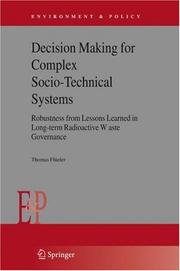
ISBN: 1280461071 9786610461073 1402035292 1402034806 9400789084 Year: 2006 Publisher: Dordrecht ; [London] : Springer,
Abstract | Keywords | Export | Availability | Bookmark
 Loading...
Loading...Choose an application
- Reference Manager
- EndNote
- RefWorks (Direct export to RefWorks)
The long-term governance of radioactive waste continues to be a major complex and contentious socio-technical issue worldwide. Traditionally, it has been considered as mainly a challenge to scientists and engineers to develop technical "solutions" to specific problems. But increasingly these narrow solutions have been enlarged by wider societal considerations such as ethics, public involvement, control and retrievability – needs that have in the meanwhile been recognised by the nuclear community, at least in a general way. In this book, we analyse motives for a broad discourse as well as suggest prerequisites to launch it. The author attempts to give a novel, empirically based and technically sound treatment of fundamental issues in long-term management and governance. Written to be accessible to a wide selection of the interested public, the study proposes a combination of technical design issues, analysis methods and institutional backup in a dynamic procedure, and with involvement at all levels of political, commercial and social life.
Radioactive wastes --- Management. --- Social aspects. --- Nuclear wastes --- Radwastes --- Wastes, Nuclear --- Wastes, Radioactive --- Hazardous wastes --- Nuclear engineering --- Radioactive substances --- Waste disposal. --- Environmental management. --- Economics. --- Environmental toxicology. --- Environmental protection. --- Waste Management/Waste Technology. --- Environmental Management. --- Political Economy/Economic Systems. --- Ecotoxicology. --- Effects of Radiation/Radiation Protection. --- Environmental quality management --- Protection of environment --- Environmental sciences --- Applied ecology --- Environmental engineering --- Environmental policy --- Environmental quality --- Ecotoxicology --- Pollutants --- Pollution --- Environmental health --- Toxicology --- Economic theory --- Political economy --- Social sciences --- Economic man --- Environmental stewardship --- Stewardship, Environmental --- Management --- Monograph --- Waste management. --- Economic policy. --- Radiation protection. --- Radiation—Safety measures. --- Radiation monitoring --- Radiation protection --- Economic nationalism --- Economic planning --- National planning --- State planning --- Economics --- Planning --- National security --- Social policy
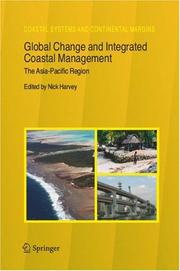
ISBN: 1280902442 9786610902446 1402036280 1402036272 9400789122 Year: 2006 Publisher: Dordrecht : Springer,
Abstract | Keywords | Export | Availability | Bookmark
 Loading...
Loading...Choose an application
- Reference Manager
- EndNote
- RefWorks (Direct export to RefWorks)
Most of the world’s population lives close to the coast and is highly dependent on coastal resources, which are being exploited at unsustainable rates. These resources are being subject to further pressures associated with population increase and the globalization of coastal resource demand. This is particularly so for the Asia-Pacific region which contains almost two thirds of the world’s population and most of the world’s coastal megacities. The region has globally important atmospheric and oceanic phenomena, which affect world climate such as the Asian Monsoon and the El-Niño Southern Oscillation phenomena. The Asia-Pacific region also has highly significant marine diversity but over the last few decades, coastal resources such as mangroves, coral reefs and fisheries have experienced large-scale depletion. The need to find appropriate management solutions to these and other coastal issues is made more complex by the need to take account of international scientific predictions for global climate change and sea-level rise which will further impact on these coasts. The idea for this book arose from a meeting of coastal scientists in Kobe, Japan in May 2003. The meeting was organized by the Asia-Pacific Network for Global Change Research (APN), an inter-governmental network, comprising 21 member countries, for the promotion of global change research and links between science and policy making in the region.
Coastal zone management --- Global environmental change --- Coast ecosystem management --- Coastal ecosystem management --- Coastal management --- Coastal resource management --- Coastal resources management --- Coastal zone ecosystem management --- Coasts --- CRM (Coastal resource management) --- Zone management, Coastal --- Ecosystem management --- Natural resources --- Regional planning --- Coastal engineering --- Management --- Geography. --- Climatic changes. --- Environmental management. --- Physical geography. --- Earth Sciences, general. --- Climate Change. --- Environmental Management. --- Physical Geography. --- Geography --- Environmental stewardship --- Stewardship, Environmental --- Environmental sciences --- Changes, Climatic --- Changes in climate --- Climate change --- Climate change science --- Climate changes --- Climate variations --- Climatic change --- Climatic changes --- Climatic fluctuations --- Climatic variations --- Global climate changes --- Global climatic changes --- Climatology --- Climate change mitigation --- Teleconnections (Climatology) --- Cosmography --- Earth sciences --- World history --- Environmental aspects --- Earth sciences. --- Climate change. --- Geosciences --- Physical sciences

ISBN: 1280902450 9786610902453 1402046049 1402037392 9048169488 Year: 2006 Publisher: Dordrecht : Springer,
Abstract | Keywords | Export | Availability | Bookmark
 Loading...
Loading...Choose an application
- Reference Manager
- EndNote
- RefWorks (Direct export to RefWorks)
Macro-engineering involves the large-scale modification and manipulation of natural systems for the benefit of mankind. The primary goals of some Earth-based macroprojects described in this book are power production, land reclamation, food production, climate change, environment, water, transport and coastal protection. Other Earth or space projects considered here have a more futuristic ring, but our present-day technical skill makes their realization possible. Earth-based macroprojects usually combine different aspects and aims. They have a major impact on the ecology of a region and the inhabitants' means of living (like tourism, fishing, shipping). Its effects may be felt worldwide, like the rise in global sea level after the damming and evaporation of large ocean gulfs for power production, or the change in climate following the regional reduction of solar insolation. Audience: This book will be of interest to researchers involved in macroprojects and students of Natural Sciences and Engineering.
Environmental geotechnology. --- Environmental engineering. --- Large scale systems. --- Systems, Large scale --- Engineering systems --- System analysis --- Environmental control --- Environmental effects --- Environmental stresses --- Engineering --- Environmental health --- Environmental protection --- Pollution --- Sustainable engineering --- Environmental geotechnics --- Geoenvironmental engineering --- Geotechnical engineering --- Environmental engineering --- Environmental geology --- Environmental management. --- Engineering. --- Life sciences. --- Environmental Management. --- Engineering, general. --- Popular Science in Nature and Environment. --- Biosciences --- Sciences, Life --- Science --- Construction --- Industrial arts --- Technology --- Environmental stewardship --- Stewardship, Environmental --- Environmental sciences --- Management --- Nature. --- Environment. --- Balance of nature --- Biology --- Bionomics --- Ecological processes --- Ecological science --- Ecological sciences --- Environment --- Environmental biology --- Oecology --- Population biology --- Ecology
Book
ISBN: 1280611405 9786610611409 1402037570 Year: 2006 Publisher: Dordrecht : Springer,
Abstract | Keywords | Export | Availability | Bookmark
 Loading...
Loading...Choose an application
- Reference Manager
- EndNote
- RefWorks (Direct export to RefWorks)
Monitoring Nature Conservation in Cultural Habitats presents monitoring as an integral component of responsible conservation management and as a catalyst for decision making. The early sections of the book cover key areas in the development of a monitoring project, including: - The roles of survey and surveillance - Incorporating knowledge from existing research - Identifying the conservation priority on sites - Minimising observer error - Identifying site-specific condition indicators for habitats - Collecting monitoring data The later sections of the book comprise a series of case studies covering a wide range of habitats and species. These case studies focus mostly, though not exclusively, on sites that form part of the Natura 2000 series in Europe. Written in a clear and concise style, and illustrated in colour throughout, this practical guide is an invaluable reference for conservationists and ecologists responsible for managing and monitoring land for nature conservation, for organisations responsible for implementing agri-environment schemes, and for researchers working in the field of applied ecology.
Nature conservation --- Conservation of natural resources --- Conservation of resources --- Natural resources --- Natural resources conservation --- Resources conservation, Natural --- Environmental protection --- Natural resources conservation areas --- Conservation of nature --- Nature --- Nature protection --- Protection of nature --- Applied ecology --- Conservation biology --- Endangered ecosystems --- Natural areas --- Conservation --- Life sciences. --- Conservation biology. --- Plant Ecology. --- Zoology. --- Environmental management. --- Landscape ecology. --- Life Sciences, general. --- Conservation Biology/Ecology. --- Environmental Management. --- Landscape Ecology. --- Ecology --- Environmental stewardship --- Stewardship, Environmental --- Environmental sciences --- Management --- Biology --- Natural history --- Animals --- Botany --- Plants --- Biosciences --- Sciences, Life --- Science --- Phytoecology --- Vegetation ecology --- Ecology . --- Plant ecology. --- Balance of nature --- Bionomics --- Ecological processes --- Ecological science --- Ecological sciences --- Environment --- Environmental biology --- Oecology --- Population biology --- Floristic ecology
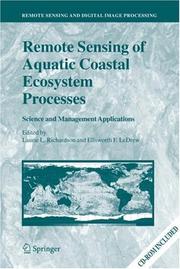
ISBN: 1280612584 9786610612581 1402039689 1402039670 9781402039676 9781402039683 9401784256 Year: 2006 Publisher: Dordrecht Springer
Abstract | Keywords | Export | Availability | Bookmark
 Loading...
Loading...Choose an application
- Reference Manager
- EndNote
- RefWorks (Direct export to RefWorks)
The aquatic coastal zone is one of the most challenging targets for environmental remote sensing. Properties such as bottom reflectance, spectrally diverse suspended sediments and phytoplankton communities, diverse benthic communities, and transient events that affect surface reflectance (coastal blooms, runoff, etc.) all combine to produce an optical complexity not seen in terrestrial or open ocean systems. Despite this complexity, remote sensing is proving to be an invaluable tool for "Case 2" waters. This book presents recent advances in coastal remote sensing with an emphasis on applied science and management. Case studies of the operational use of remote sensing in ecosystem studies, monitoring, and interfacing remote sensing/science/management are presented. Spectral signatures of phytoplankton and suspended sediments are discussed in detail with accompanying discussion of why blue water (Case 1) algorithms cannot be applied to Case 2 waters. Audience This book is targeted for scientists and managers interested in using remote sensing in the study or management of aquatic coastal environments. With only limited discussion of optics and theory presented in the book, such researchers might benefit from the detailed presentations of aquatic spectral signatures, and to operational management issues. While not specifically written for remote sensing scientists, it will prove to be a useful reference for this community for the current status of aquatic coastal remote sensing.
Remote sensing. --- Ecology. --- Remote-sensing imagery --- Remote sensing systems --- Remote terrain sensing --- Sensing, Remote --- Terrain sensing, Remote --- Aerial photogrammetry --- Aerospace telemetry --- Detectors --- Space optics --- Balance of nature --- Biology --- Bionomics --- Ecological processes --- Ecological science --- Ecological sciences --- Environment --- Environmental biology --- Oecology --- Environmental sciences --- Population biology --- Ecology --- Coastal ecology --- Aquatic biology. --- Environmental management. --- Algorithms. --- Remote Sensing/Photogrammetry. --- Freshwater & Marine Ecology. --- Environmental Management. --- Optics, Lasers, Photonics, Optical Devices. --- Algorism --- Algebra --- Arithmetic --- Environmental stewardship --- Stewardship, Environmental --- Management --- Hydrobiology --- Water biology --- Aquatic sciences --- Foundations --- Aquatic ecology . --- Lasers. --- Photonics. --- New optics --- Optics --- Light amplification by stimulated emission of radiation --- Masers, Optical --- Optical masers --- Light amplifiers --- Light sources --- Optoelectronic devices --- Nonlinear optics --- Optical parametric oscillators --- Aquatic biology
| Listing 1 - 10 of 57 | << page >> |
Sort by
|

 Search
Search Feedback
Feedback About UniCat
About UniCat  Help
Help News
News